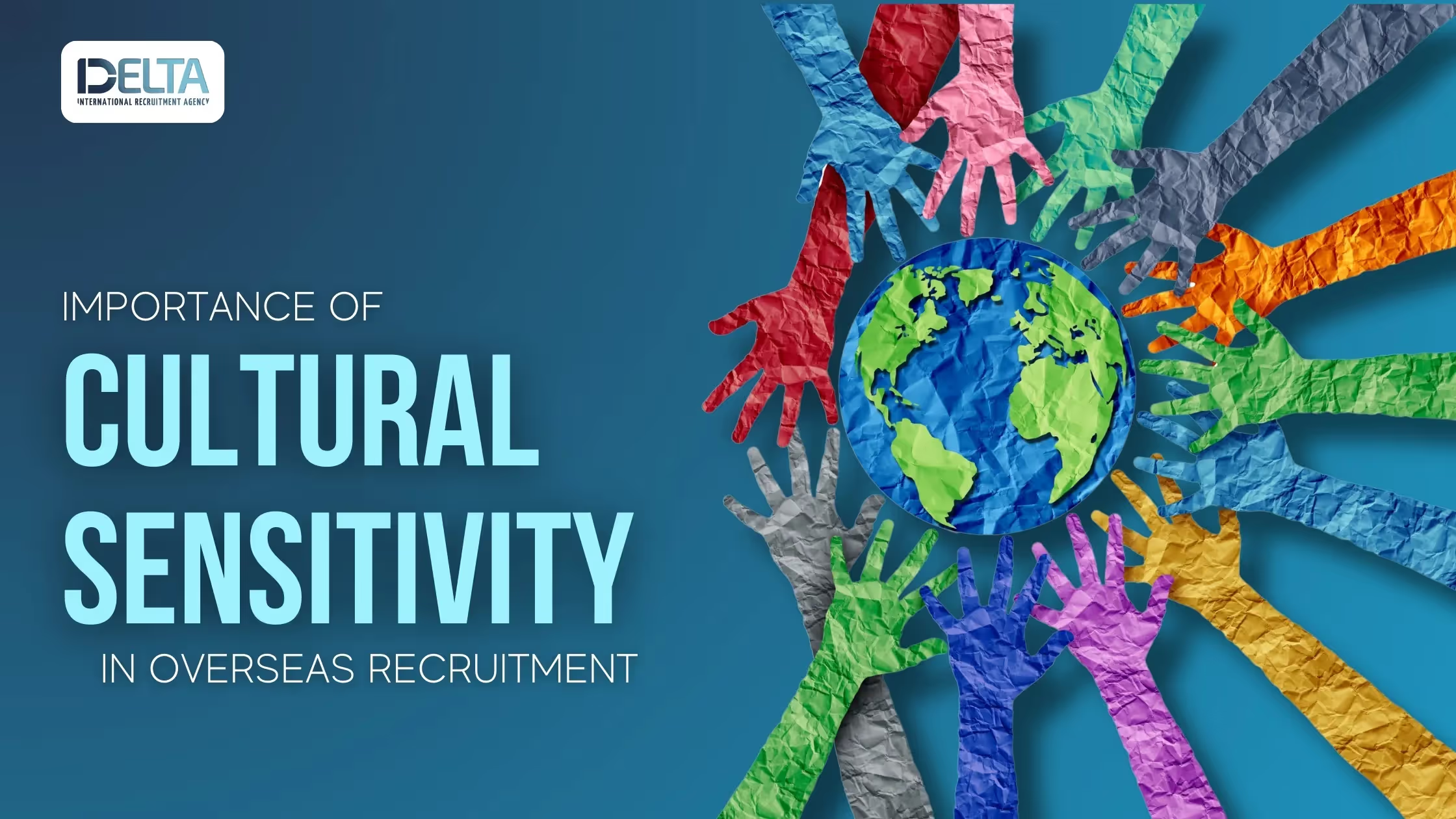Imagine you're tasked with recruiting top talent from around the globe. You craft the perfect job listing, but cultural misunderstandings create barriers. Cultural sensitivity in recruitment bridges these gaps, ensuring fairness and inclusivity for all candidates.
In today's globalized world, overseas recruitment is not just about skills. It's about respecting diverse cultural landscapes. This blog explores the importance of cultural sensitivity, its benefits, and strategies to create a culturally aware recruitment process, ultimately building a stronger, more diverse team.
What is Cultural Sensitivity?
Cultural sensitivity is the ability to understand and respect the beliefs, values, and customs of people from other cultures. In the context of overseas recruitment, cultural sensitivity is essential for ensuring that the recruitment process is fair and equitable for all candidates, and that the resulting workforce is diverse and inclusive.
There are a number of benefits to being culturally sensitive in overseas recruitment. First, it can help to create a more inclusive workplace environment, where all employees feel welcome and respected. Second, it can help to improve the quality of the recruitment process, by ensuring that all candidates are given a fair chance to compete for the job. Third, it can help to reduce the risk of cultural misunderstandings and conflict in the workplace.
However, there are also a number of challenges to cultural sensitivity in overseas recruitment. One challenge is that it can be difficult to understand the cultural values and beliefs of people from other cultures. Another challenge is that it can be difficult to create a recruitment process that is fair and equitable for all candidates, regardless of their cultural background.
Despite the challenges, cultural sensitivity is essential for successful overseas recruitment. By being culturally sensitive, employers can create a more inclusive workplace environment, improve the quality of the recruitment process, and reduce the risk of cultural misunderstandings and conflict.
What is Cultural Sensitivity in Overseas Recruitment?
There are a number of ways to promote cultural sensitivity in overseas recruitment for countires like Saudi Arbaia. Here are a few examples:
- Provide training for recruiters on cultural awareness and sensitivity.
- Use culturally appropriate recruitment materials.
- Create a diverse and inclusive workplace culture.
- Empower employees to speak up about cultural issues.
By taking these steps, employers can create a more welcoming and inclusive workplace for employees from all cultures.
Benefits of Cultural Sensitivity in Overseas Recruitment
- Increased diversity and inclusion in the workplace
- Improved employee morale and productivity
- Enhanced brand reputation
- Improved customer satisfaction
- Reduced risk of cultural conflict
By being culturally sensitive, employers can create a more welcoming and inclusive workplace for employees from all cultures. This can lead to increased employee morale and productivity, as well as improved brand reputation and customer satisfaction. Additionally, by being culturally sensitive, employers can reduce the risk of cultural conflict in the workplace.
Challenges of Cultural Sensitivity in Overseas Recruitment
There are a number of challenges associated with cultural sensitivity in overseas recruitment, including:
- Lack of awareness of cultural differences. Many people are not aware of the different cultural norms and values that exist in different countries. This can lead to misunderstandings and conflict in the workplace.
- Bias and discrimination. Even when people are aware of cultural differences, they may still hold biases and prejudices against people from other cultures. This can make it difficult to create a welcoming and inclusive workplace.
- Language barriers. Language barriers can make it difficult to communicate effectively with people from other cultures. This can lead to misunderstandings and conflict.
- Cultural isolation. People who are from a different culture may feel isolated and excluded from the workplace. This can lead to feelings of resentment and low morale.
These challenges can be overcome by taking steps to increase cultural awareness, promote diversity and inclusion, and provide support for employees from different cultures.

Image Source: kloudportal.com
Strategies for Promoting Cultural Sensitivity in Overseas Recruitment
There are a number of strategies that can be used to promote cultural sensitivity in overseas recruitment. These include:
- Encourage diversity in the recruitment process. This means making sure that you are considering candidates from a variety of cultures and backgrounds.
- Provide training for recruiters on cultural sensitivity. This training should help recruiters to understand the different cultural values and norms of potential candidates, and how to avoid making cultural faux pas.
- Create a welcoming and inclusive workplace culture. This means making sure that all employees feel respected and valued, regardless of their culture or background.
- Provide support for employees from different cultures. This can include providing cultural mentors, translators, and other resources.
- Embrace cultural differences. This means valuing the different perspectives and experiences that employees from different cultures can bring to the workplace.
By implementing these strategies, you can create a more culturally sensitive workplace that is welcoming and inclusive of employees from all cultures.
Best Practices for Culturally Sensitive Overseas Recruitment
There are a number of best practices that employers can follow to ensure that they are culturally sensitive in their overseas recruitment efforts. These include:
- Doing your research. Before you begin recruiting candidates from other cultures, it is important to do your research and learn about the cultural norms and values of the countries you are targeting. This will help you to avoid making cultural missteps and to create a more welcoming and inclusive recruitment process.
- Using a culturally competent recruiter. If you do not have the cultural knowledge or experience to recruit candidates from other cultures, it is a good idea to partner with a recruiter who does. A culturally competent recruiter will be able to help you identify and attract the best candidates from a diverse range of backgrounds, and will also be able to provide guidance on how to create a culturally sensitive recruitment process.
- Providing clear and concise information about the job and the company. When you are communicating with candidates from other cultures, it is important to make sure that you provide clear and concise information about the job and the company. This will help to ensure that candidates understand what is expected of them and that they are not misled about the position or the company.
- Using culturally appropriate language and images. When you are communicating with candidates from other cultures, it is important to use culturally appropriate language and images. This will help to show candidates that you respect their culture and that you are welcoming and inclusive.
- Being open to feedback. During the recruitment process, it is important to be open to feedback from candidates. This will help you to identify any areas where you can improve your recruitment process and to make it more culturally sensitive.
By following these best practices, employers can help to ensure that they are culturally sensitive in their overseas recruitment efforts. This will not only help to attract the best candidates from a diverse range of backgrounds, but it will also create a more welcoming and inclusive workplace.
Conclusion
In conclusion, cultural sensitivity is an essential skill for recruiters who are working with candidates from different cultures. By being culturally sensitive, recruiters can create a more welcoming and inclusive environment for all candidates, and they can also help to ensure that the best possible candidates are hired for the job.
If you are a recruiter who is looking to improve your cultural sensitivity, there are a number of resources available to you. You can read books and articles on the topic, attend workshops or trainings, or seek out mentorship from someone like Delta International Top in Recruitment Agencies in Pakistan who has experience working with people from different cultures.
By taking the time to learn about different cultures and how to interact with people from those cultures, you can make a positive impact on the recruitment process and help to create a more diverse and inclusive workplace.




























